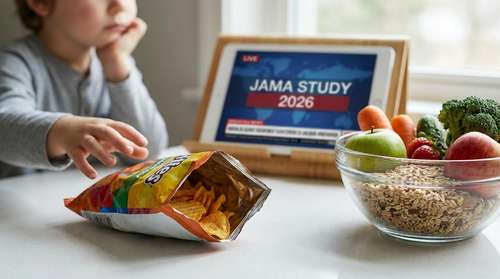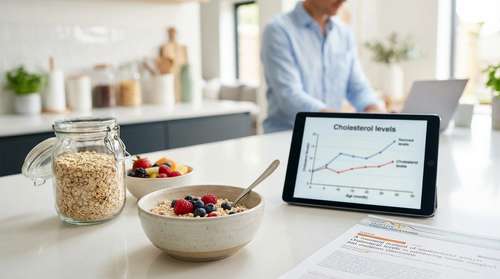Ultra-processed foods have become a staple in many households, but have you ever wondered what they're really doing to your body? Many of us enjoy the convenience of ready-to-eat meals and snacks, yet recent discussions suggest that these foods could be making inflammatory bowel disease (IBD) symptoms even worse. It’s a bit like inviting a guest over who seems harmless at first but eventually disrupts your entire day. As we dig deeper, it’s clear that the processed food impact on our gut health might be far more serious than we imagined.
There is growing evidence that ultra-processed foods, loaded with food additives and artificial ingredients, contribute to gut inflammation. For those grappling with inflammatory bowel disease, this could be a crucial factor that exacerbates their condition. The idea that what you eat can worsen IBD has scientists and health experts urging us to re-examine our IBD diet and prioritize whole, unprocessed foods that truly nourish the body.
We all want to make choices that lead to better overall digestive health, but the modern diet filled with processed food dangers often puts us at a disadvantage. In this article, we'll break down the key issues related to ultra-processed foods, understand their impact on inflammatory bowel disease, and explore potential dietary adjustments to help manage IBD symptoms. Let's embark on this journey to a healthier gut together!
Understanding Ultra-Processed Foods
When we talk about ultra-processed foods, we're referring to items that have been heavily modified from their natural state, often containing numerous additives to enhance flavor and shelf life. These ingredients might boost taste, but they also pose significant risks for our gut health. The discussion about processed food impact goes beyond just calories and nutrition—it's a conversation about the ingredients that could be fueling inflammation.
This section sheds light on what qualifies as ultra-processed. Many processed food risks stem from synthetic additives, high levels of sugars, and unhealthy fats that can potentially worsen IBD. Imagine trying to fix a leak in a pipe while pouring abrasive chemicals down the drain—the problem is compounded rather than solved. In the same way, feeding the body with food additives can create chronic irritation in the gut, leading to heightened IBD symptoms.
Despite the appeal of convenience, it’s crucial to recognize that ultra-processed foods are engineered rather than naturally occurring. The evidence points to a strong correlation between such diets and increased gut inflammation. Experts stress that understanding the ingredients list and opting for foods in their natural state can be a game changer in IBD management.
IBD and Its Challenges
Inflammatory bowel disease is a complex condition characterized by chronic inflammation of the digestive tract. People suffering from IBD often experience recurring pain, bloating, and significant discomfort that can disrupt daily life. It’s more than just a food issue; it’s a lifelong challenge that demands careful attention to one’s diet.
Navigating through IBD requires constant vigilance about what goes into your body. Ultra-processed foods have been repeatedly flagged as a potential culprit that can worsen IBD symptoms. Think of it as adding gasoline to a fire—the inflammatory response in the gut gets ramped up, making the condition harder to control. Research suggests that the high levels of artificial sweeteners, preservatives, and other additives found in processed food can trigger a heightened immune response.
Living with IBD means that even small dietary changes can have big consequences. You might be cutting back on certain prepared meals and beginning to explore fresh, whole foods instead. These adjustments in your IBD diet can reduce the inflammatory burden on your body while also improving overall digestive health. It's these little choices everyday that add up to noticeable benefits over time.
Impact on Gut Health and Inflammation
This topic is close to heart because gut inflammation plays a key role in IBD. It’s interesting to note that many ultra-processed foods have been linked with poor gut health. The relationship between diet and IBD is complex, involving the interplay between food additives, artificial colors, and flavor enhancers that can severely disrupt the natural balance of the gut microbiome.
When the gut microbiome is thrown off balance, it’s almost like a well-organized team suddenly falling apart—conflict ensues, and the body starts to react with increased inflammation. Individuals with IBD might notice that traditional diets rich in whole foods like fruits, vegetables, and lean proteins tend to yield better digestive outcomes. It might not be a magic bullet, but steering clear of processed food dangers can contribute to a calmer and more balanced gut environment.
Some people have found that even small changes in their diet can lead to significant improvements in IBD symptoms. It’s a scenario where anecdotal experiences and clinical research converge, suggesting that a shift toward natural, minimally processed foods may benefit those struggling with gut inflammation. This relationship calls for more awareness, and it emphasizes the importance of monitoring what we eat when managing inflammatory bowel disease.
Dietary Adjustments for IBD Management
The good news is that modifying your diet doesn’t have to be an all-or-nothing approach. Gradual changes can lead to noticeable improvements in digestive health for those with IBD. Focusing on an IBD diet rich in whole foods can serve as a counterbalance to the negative effects of ultra-processed foods. Starting by incorporating more fruits, vegetables, and lean proteins into your meals is a solid step toward reducing gut inflammation.
Consider it like tending to a garden: if you remove the weeds (ultra-processed foods) and plant nourishing seeds (whole foods), you’ll likely see a more vibrant and healthy outcome. Many find that reducing food additives and artificial ingredients helps alleviate common IBD symptoms. Simple swaps, such as choosing a fresh salad over a processed snack or cooking a meal at home instead of relying on instant meals, can make a world of difference.
Have you ever experienced a day when your stomach felt less inflamed after eating a balanced meal? That’s a reminder of how powerful food can be in influencing our health. A diet emphasizing natural ingredients may be key in reducing the processed food impact on digestive health. Conversations with health professionals often stress the importance of personalized nutrition plans, especially for those grappling with inflammatory bowel disease. It’s a holistic approach where every meal contributes to overall IBD management.
In practical terms, many individuals opt to experiment with their diets, seeking foods that help maintain a stable gut environment. Tracking which foods trigger flare-ups and which help soothe them can be an effective strategy. While it might seem daunting initially, the journey toward a healthier gut starts with taking small, mindful steps.
A Personal Look at Navigating Processed Food Impact
Every journey in managing IBD is unique, and it’s important to remember that you are not alone. I’ve spoken with several individuals who shared their stories of battling IBD, and one common thread is the challenge posed by ultra-processed foods. Their experiences remind us that while these foods are convenient, they might carry hidden dangers for our digestive system.
It’s easy to feel overwhelmed by the sheer number of dietary choices available, but focusing on simple, healthy changes can pave the way for better gut health. Transitioning from processed to whole foods is like upgrading to a more reliable engine—everything runs smoother. As you make these shifts, you're not just managing a condition; you're taking charge of your well-being, one meal at a time.
Small experiments, like cooking a simple meal with fresh vegetables and lean proteins, often lead to noticeable changes. This hands-on approach can be incredibly empowering for someone trying to mitigate IBD symptoms. As you listen to your body, you’ll start to notice which foods add fuel to the inflammatory fire and which ones help cool it down. It’s all about designing a diet that supports long-term digestive health and overall wellbeing.
Before wrapping up, it's worth noting that the dialogue around ultra-processed foods and their role in IBD continues to evolve. With ongoing research and personal testimonies, the message is consistent: mindful eating matters. By choosing whole, natural foods, you can potentially reduce the adverse effects that processed food risks pose on inflammatory bowel disease.
In conclusion, understanding the complex relationship between ultra-processed foods and IBD is crucial for anyone looking to optimize their digestive health. Whether you’re actively managing IBD or simply striving for better gut health, a shift towards a diet rich in unprocessed, whole foods could be a transformative step. Embrace the journey of exploration and changes in your daily eating habits, and your gut might just thank you for it!




